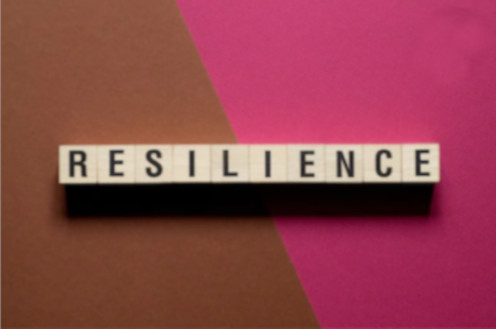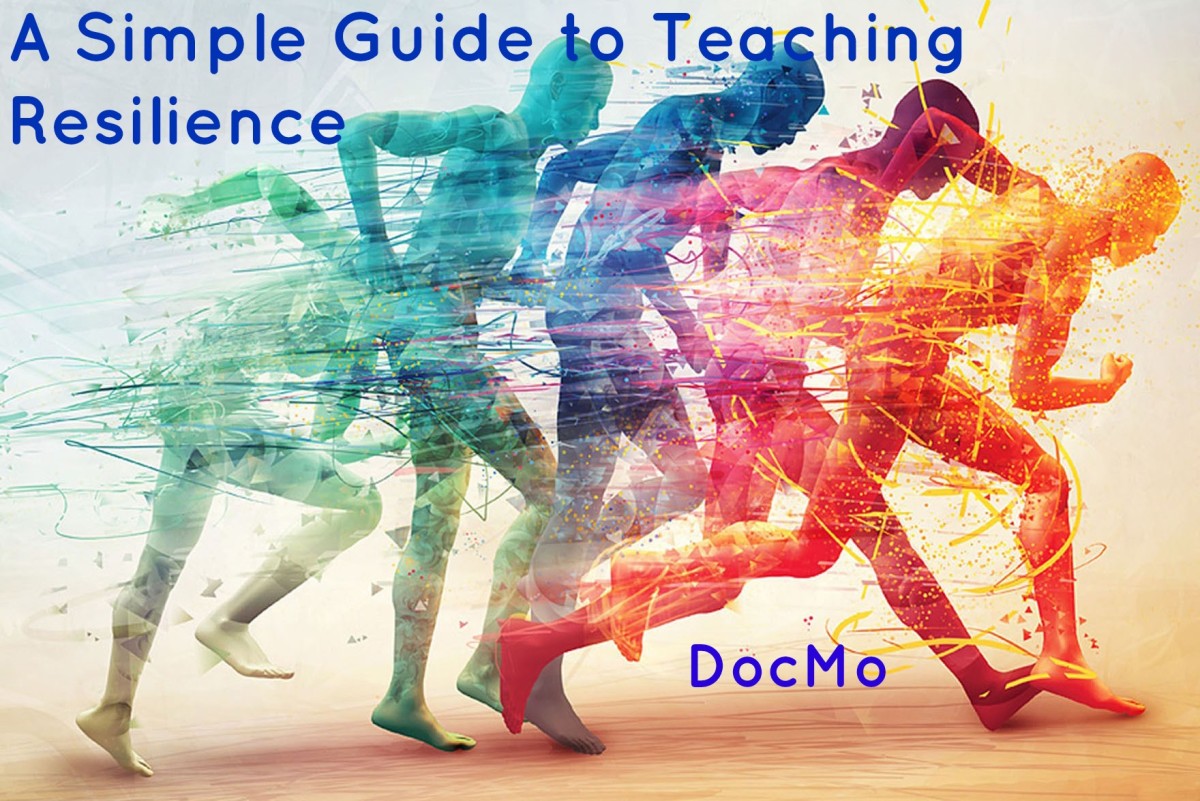You, Yes You, Can Develop Resilience

What does it mean to be resilient? How do you know if you're in possession of the quality that we call resilience? Merriam-Webster.com defines “resilience” as:
1: the capability of a strained body to recover its size and shape after deformation caused especially by compressive stress; 2: an ability to recover from or adjust easily to misfortune or change.
While these are good definitions, I would like to offer my own insight to go along with what Merriam-Webster said. Based on my life experiences, resilience is much more than the ability of an individual to bounce back up from many of life’s ultimate “beat downs.” I believe, beyond "ability" and "capability," resilience is also inextricably tied to the idea of desiring to bounce back up.

The Desire to Bounce Back
To me, the definition of resilience must also consider the desire to bounce back, because I believe it is the desire that ultimately is the difference between getting up, and giving up. You can have the ability to do something, and simply not the desire. And without desire, the ability isn't worth much.
For me, as a Believer in the Christian faith, I see resilience as being related to having an understanding of and an appreciation for a body, a mind, and a spirit that were formed with much more than simply the capacity or the ability to weather storms. They were each formed with the desire to weather them.

As human beings, I believe we were formed by God to have a powerful desire to recover from setbacks. Fueling this is a desire to connect with something greater than us; something that can empower us from within with the strength and the will to fly through and above life’s raging storms. We were given the need and the desire to discover a type of confidence that looks and feels a lot like “peace.” Having resilience, to me, means being confident in the knowledge that no matter what comes against you, you will want to get up and you will desire to go on, all the while knowing that no matter what, you are going to be alright.
I am a self-publishing and marketing communications consultant, and my “avocation” is writing fiction novels. Years ago, I completed the second in a ten-book collection of fiction novels that I call my "Color of Love" collection. The multi-genre books combine romance, crime, mystery, and history ("romacrimistory"). The title of Book Two in the collection is Gold, Heat, and Refinement. In it, the young protagonist is on a journey to refinement that takes her through some of the toughest times of her life, while she and her fiancé are planning their wedding. She learns the true meaning of resilience after situations and circumstances take her, over and again, to a point where she must decide whether or not it is time for her to call off her wedding.
And that’s what resilience is. Being resilient will help you up from a down place. And, although it might not always cause you to land in the exact spot where you were planning on sticking your landing, being resilient will help you adjust successfully, no matter where you land after bouncing back up.

Seven Things You Can Do to Strengthen Your "Resilience"
In addition to what I believe is a God-given, human need for strong, faith-based spiritual center, I believe there are ways you can develop resilience. Here are seven things I believe anyone can do that will ultimately strengthen resilience:
- Maintain a strong "support system." Develop strong, positive, close relationships with loved ones and friends. Learn to communicate, to talk to others who may have gone through similar experiences. Learning how someone else "made it over" a rough spot can help you gain the perspective you need to make it over yours too.
- Make helping others part of your life, from friends and neighbors, to those you don't even know. Find a way to reach out and help someone else in their time of need.
- Learn to view hardship, knock downs and setbacks as challenging opportunities; experiences from which you can learn and grow wiser. Look for what you can learn from what you go through.
- Live in faith and hope, despite the fact that change—the only constant—is inevitable. Learn to expect life to come with change; understand that the challenges of life can help prepare you for growing pains that can accompany change.
- Accept that you might have to “let go” of some of the things you once wanted, that you might not get in life. The old Serenity Prayer can help. Ask God to grant you the serenity you need to accept what you cannot change, the courage to change what you can, and the wisdom to know the difference.
- Develop a positive outlook on life that results in positive, goal-affirming self-talk. Learn to “talk yourself” toward what you want to accomplish with your life. You might not get what you set out to get as your ultimate goal, but you will always get something great for taking any journey toward reaching any goal.
- Love and take care of yourself. Have respect for what your body needs for nutrition and strength, what your mind needs for intelligence and wisdom, and what your spirit needs for regeneration and stirring.

Strength from Hardship
Are you familiar with the term resistance training? This is a term that describes a process where weights are used to build muscle. Lighter weights may be used initially, and as the muscles become stronger, stronger weights are required to continue developing and building muscle. This is a good analogy for how hardship, struggle, and adversity can actually serve to help make us stronger.
Going through stuff that beats you down can ignite your resistance to do the work required to build the mental muscle you need to fight back; to face stress and anxiety in a positive manner, and to shield you from the destructive potential of self-pity and depression.
Just as weights used in resistance training are not for the purpose of harming us, we do not have to allow the struggles and trials we go through in life to harm our spirit. And with a strong spirit, I believe you can bounce back from just about any setback, and that the more adversity you face, the stronger you can become.
Loving Yourself is Critical to Being Resilient
In order to be resilient in spirit, I believe it is vital that you care about yourself and your worth as a human being. Not only must you have a special kind of respect and affection for your own being before you can truly love others, loving you is also a prerequisite to having a loving concern for your spirit: That thing that will empower your desire to bounce up from any knock down or setback. Without loving concern for yourself, why would you feel any need to get up and try again?
Learning to love yourself wholly and completely can be viewed as a way of protecting you from any negative consequences or "fallout" that can happen as the result of going through tough times. Bitterness, self-pity, and depression, for example, cannot abide, peacefully, along side a strong spirit that is founded upon loving self-respect. Learning to have and to demonstrate a deeper, more meaningful love for yourself and others can help you build a solid foundation for getting out of your own way when it’s time to get back up after being knocked down.
As a devoted Believer grounded in the Christian faith, I believe hardship and struggles are not meant to break us down and leave us broken in spirit. I also believe that, sometimes, when I find myself experiencing spiritual lethargy, it is because I have not learned needed lessons God is providing for me in what I’m going through. It could be that I am allowing pride or some other “lower” spirit to stand between me and what God is trying to show and to teach me.
Just as I had to learn to use weights properly to get maximum benefit from strength training for my muscles, I realize that I must also learn to view, properly, any lessons God puts before for me in my life, so that I can gain maximum spiritual growth from challenging and trying times, situations, and circumstances.
Here are 5 ways my belief in God and Jesus Christ has helped me in my quest to become more resilient in times of adversity and trial:

- I remind myself of what God has already done for me. After all, if God came to my rescue or helped me in the past —I believe He will surely do it once again.
- I resist fear, because I know that having fear, as opposed to having courage, is not of God. According to the Bible, Satan is the Father of Fear and Doubt. Therefore, I stay strong and steadfast in my belief, faith, and trust in God through Jesus Christ.
- I direct my thoughts to God. Every day, I focus in on special problems, and I concentrate prayer on these problems. If I have a need for knowledge, I ask God to guide me to sources containing what I need to know. I search God’s instruction book, the Bible, and I also stay tuned in to my own inner voice. I expect to receive my help from God, but I know that I must act too, to do what I can to make things better.
- I pray throughout the day. I don’t just pray in the morning or at night. I pray throughout the day, talking to God as the day unfolds. In addition to keeping me grounded, doing this helps me meet the challenge of unexpected sources of stress. By staying in touch with God, I’m able to overcome and endure what life sends. By heeding God’s word, I take life by the “smooth handle” rather than by the “rough handle.”
- I wait patiently on God for answers. I struggle not to allow the pace of life, or the pace and the anxiety of stressful times and challenges to cause me to lose sight of God and His ways. I remind myself that God does not always operate like an ATM machine. I know I cannot always just punch in a few prayers and expect to get an instantaneous response. In love, trust and faith, I give my troubles to God, and I wait patiently to discover or to sense His guidance as I decide what I want to be, or what needs to be, my next move.
Learning to love yourself in a way that helps you keep a close watch on your self-respect, I believe, is a good way to ensure you will always have resilience in your times of need. Developing and then nurturing a type of loving self-respect can help to ensure that you have what it takes to live a rich, fulfilling and spiritually satisfying life that you can enjoy and be honored by.
The Bible tells us in Proverbs, 25:38 “He that hath no rule over his own spirit is like a city that is broken down, and without walls.” I believe the desire to bounce back up from life's many beat downs is represented by the "walls" spoken of in this Scripture. The desire to get back up is what protects our spirit from remaining on the ground or in ruins, "like a city that is broken down."
© 2012 Sallie B Middlebrook PhD








